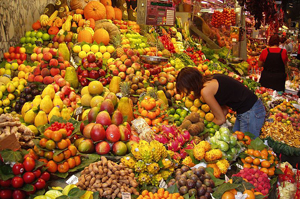Plants for Health
Español  Dansk
Dansk 
Our health depends on plants:
- for food,
- for medicines,
- for creating a healthy environment.
Food
We need to eat plants to stay healthy. Fruits, vegetables, cereals, pulses (peas and beans), tubers (eg potatoes), and nuts are all plants. There is strong evidence to show that we are naturally plant eating animals, and evolved from tree dwelling apes who ate mostly fruits, leaves, and sometimes nuts. Our guts are long - like that of herbivores, which are designed to digest vegetation. The guts of carnivores are short to enable them to expel decomposing meat residues quickly. Meat is full of toxins from the animal at the time of death, and these toxins can be absorbed into the blood, contributing to all sorts of disorders, including headaches, arthritis, cancer and heart disease. Because we do not have a digestive system designed to cope with meat, our health will suffer if we eat it.

And apart from mothers' milk for babies, dairy products are not a natural food for us. Milk, cheese, butter, cream, etc cause many problems including eczema, asthma, allergies of all kinds, hayfever, digestive disorders, arteriosclerosis and osteoporosis (a disease where bones loose their calcium, become brittle and break easily). Yet doctors often tell us to drink plenty of milk to prevent osteoporosis. But cow's milk is difficult to digest and generates a lot of mucus in the body. Its calcium is neither balanced nor easily available, and milk actually helps to create osteoporosis. This problem can be prevented by plants, ie relying on green vegetables, pulses and nuts which are much better sources of calcium (and magnesium - which is needed for calcium utilisation).
Taking adequate exercise is also important.
There is ample medical evidence to demonstrate that there is nothing that we need in our diet that cannot be obtained from plants (excluding vitamin D - which we get from sunshine). Even vitamin B12, originally thought to be present only in animal products - especially in the liver- is also available from certain lactic fermented foods like sauerkraut; possibly certain seaweeds; spirulina, a blue-green alga; and our own guts (if they are healthy and have not been abused with antibiotics).
Medicines
One can use a healthy well balanced diet based on natural plant foods both to:
- Maintain good health and prevent diseases;
- Treat diseases.
This use of food is called Dietary Therapy. Fresh wholefoods, eaten as close to their natural state as possible, are very effective in allowing the body to heal itself from the diseases of modern civilisation.
Processed foods and animal products, together with a lifestyle divorced from nature, are the prime causes of many diseases. But health can be gently restored using natural wholefoods and healing herbs.
Many herbs also have important medicinal qualities - and provided one does not play around with poisonous plants - they are totally free of harmful side effects - unlike the modern drug industry.
At Plants For A Future, we are growing and making available a wide variety of food plants, including herbs, perennial vegetables, fruit bearing shrubs and trees, nut trees, edible tubers, legumes and perennial cereals - together with information about them.
The use of herbal remedies, and the incorporation of these beneficial foods into the diet will help to promote health, especially if it is part of a well balanced wholefood regime with a minimum of processed foods and animal products.
Creating a Healthy Environment
Plants help to promote health in more ways than just food and medicine. Plants - especially trees and shrubs - improve the quality of the environment in many ways. They:-
- clean and oxygenate the air;
- remove carbon dioxide (a greenhouse gas);
- bind the soil and prevent its erosion;
- help control the water cycle, (encourage normal rainfall, help prevent floods and droughts);
- moderate temperature extremes.
In this way they improve the climate. Last, but not least, their greenness and vitality is very pleasant and adds an immeasurable quality to the environment.
At PFAF we are trying, more than anything, to improve the environment. We emphasise perennials because these involved far less soil disturbance and are therefore more beneficial. We hope that by making the plants and the information available, more people will be encouraged to adopt a more environmentally aware lifestyle and to live more in harmony with nature. As our diet is improved and we rely more on natural foods, and as we improve our own environment by growing plants - especially trees and shrubs - then our health can only benefit.
You might also like to have a look at the leaflets Fruit - Food of the Gods and Green Leaves which look at the nutritional aspects of fruits and leaves.
(1).jpg)